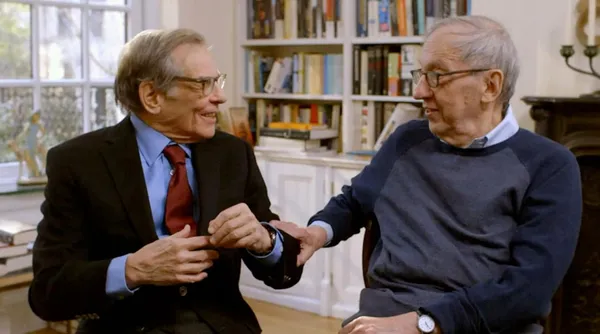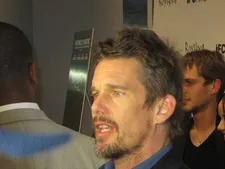Lizzie Gottlieb’s loving double portrait begins with Ethan Hawke (star of Robert Budreau’s Born To Be Blue) reading from Robert Caro’s Pulitzer Prize-winning The Power Broker: Robert Moses And The Fall Of New York (1974, Knopf, chosen by the Modern Library as one of the hundred greatest nonfiction books of the 20th Century), edited by Robert Gottlieb, and ends with a Chet Baker recording (of Richard Rodgers and Lorenz Hart’s Do it the Hard Way). In-between we have Colm Tóibín, Lynn Nesbit, David Remnick, Mary Norris, Bill Clinton, Conan O'Brien, Maria Tucci, Ina Caro and many others commenting on the dynamic duo.
 |
| Lizzie Gottlieb with Anne-Katrin Titze: “I was really thrilled to be able to interview Bill Clinton.” |
Gottlieb, who has been the editor-in-chief of Simon and Schuster, Knopf, and The New Yorker, editor of Toni Morrison (taking the cat out of the first paragraph in Sula), Doris Lessing, John Le Carré, Jessie Mitford, Bruno Bettelheim, Edna O’Brien, Salman Rushdie, Joseph Heller (turning Catch-18 into Catch-22), Ray Bradbury, Michael Crichton, Roald Dahl, John Cheever, Katharine Graham, Bill Clinton, and many more, has been collaborating with Caro for 50 years.
The suspense of the intricate and revealing Turn Every Page - The Adventures Of Robert Caro And Robert Gottlieb lies in the question of when Caro will finish what he calls “volume five of a three volume biography” on The Years Of Lyndon Johnson (National Book Critics Circle Award in Nonfiction for The Path To Power - 1982, National Book Critics Circle Award in Biography for Means of Ascent - 1990, Pulitzer Prize in Biography and National Book Award in Nonfiction for Master Of The Senate - 2002; National Book Critics Circle Award in Biography for The Passage Of Power - 2012, Alfred A Knopf Inc.). The thrill, though, lies in the process of editing, the work with words, the research, the love of language and communication, the euphoria of understanding something about power dynamics and how the world works.
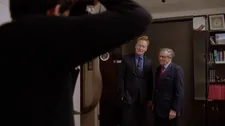 |
| Conan O'Brien with Robert Caro Photo: cinematography Carl Bartels, courtesy of Wild Surmise Productions, LLC / Sony Pictures Classics |
The two men, who share a first name and a middle initial, are reluctant to be filmed at first, and refuse to be interviewed in the same room together. “He does the work, I do the cleanup - then we fight” is how Gottlieb describes their collaboration. We learn a lot about each of them. Caro’s process is fascinating. “The only thing that matters is what is on this page” is taped on the lamp by his typewriter. There is a mot juste, he knows. Gottlieb calls him a “word painter.” There is the director’s father’s love of King Lear and lucite handbags. We get an explanation of the difference between publishing and editing (one you can teach, the other you cannot), ballet connections and why too much looming annoys him.
From New York City, Lizzie Gottlieb joined me on Zoom for an in-depth conversation on Turn Every Page - The Adventures of Robert Caro and Robert Gottlieb.
Anne-Katrin Titze: Hi Lizzie!
Lizzie Gottlieb: So nice to meet you!
AKT: Let’s start with the title, not the first half, because that is explained as coming from managing editor Alan Hathway [at Newsday]. The second part makes me curious - The Adventures Of Tom Sawyer And Huckleberry Finn? Alice’s Adventures In Wonderland? The Adventures of Tintin? What gave you that idea?
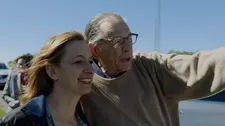 |
| Lizzie Gottlieb with Robert Caro in the Texas Hill Country Photo: cinematography Mott Hupfel, courtesy of Wild Surmise Productions, LLC / Sony Pictures Classics |
LG: You know, it just popped into my head as we were editing and I think it felt right to me because of a couple of things. I wanted to get across the idea that this is not an educational film or just an homage to two men. I wanted to express that it’s a buddy movie, it’s got energy and hopefully humour. And I felt that the books you mentioned are all books that I imagined those two Bobs read when they were children. To me it sounds a little bit old-fashioned.
AKT: Yes.
LG: I don’t know why it felt right. Nobody said no to me, so we stuck with it.
AKT: Speaking of childhood, I noticed that one of the books you show that your father edited is The Uses of Enchantment by Bruno Bettelheim. Was storytelling important in your childhood? I mean, you’re a filmmaker!
LG: Yes, my parents, my mother but also my father, read to me for hours every night. A lot of classics, a lot of Dickens. My mother’s an actress (Maria Tucci) so she’s an incredible reader. Until I was probably embarrassingly old, my mother would read to me and my father would read aloud as well. My mother is an actress as I said, so I grew up not just going to see her in plays but I would sit in the back of rehearsal rooms and watch the plays come together.
And then I would watch the performances over and over again. So in that sense I think dramatic storytelling became part of my sense of what was possible in the world. In terms of books, it’s more that the writers would come over and were close family friends. Bettelheim came to dinner once when my father was publishing him.
AKT: How was that?
LG: I was quite young, maybe five or six years old. This is embarrassing, I’m not sure I should say this, but my mother likes to tell this story. He turned to my parents during a certain point during dinner and he said “I’m very sorry to tell you this, but your daughter is already more well-adjusted than either of you!”
AKT: That’s a great Bettelheim story! Ethan Hawke is a Chet Baker link in your film (which ends with a Chet Baker discussion and song). He played Chet Baker, didn’t he [Born to Be Blue]?
LG: I completely not thought of that! You’re right! Thank you for pointing it out! I thought a lot about who to ask to read the Caro. I really did not want it to be a random famous person thrown in. I don’t really like when that happens in movies.
AKT: Yes, people who have nothing to do with what’s going on.
LG: And it doesn’t feel organic to the story or to the film. I agonised over it and we thought of Ethan and there were three reasons. One is that Ethan is both a New Yorker and a Texan. His father’s from Texas and he grew up partly in Texas, so it felt like he was appropriate for Power Broker and for the Robert Moses story and appropriate for the Lyndon Johnson story.
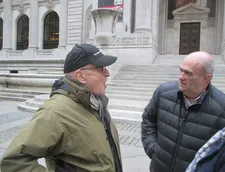 |
| Volker Schlöndorff with Colm Tóibin on the Return To Montauk set Photo: Anne-Katrin Titze |
His grandfather, I think, was a sheriff and knew Lyndon Johnson, so that kind of felt right, a grounding in both worlds. And then, kind of incredibly, I said to Bob Caro that I was thinking of asking Ethan Hawke. And he said “I love the actor Ethan Hawke! Before Sunrise is one of my favourite movies!”
AKT: Oh really?
LG: That really surprised me. And Ethan is a good friend; I’ve known him for a very long time. So it was an easy ask. I called him and he said “sure.” He came over and read the books and he loves Caro, of course. So even though none of that is expressed in the film, I hoped that it would feel appropriate and organic to have him reading. And he’s such a great reader and it was so nice of him to come and do that for us.
AKT: It’s so clear that he is a fan. It’s funny when you show all the bookshelves (of different people, having Caro books on display in the background). It’s very COVID times, but also sweet. Is there an equivalent to the semicolon for a documentary filmmaker?
LG: Is there? You tell me! What do you think?
AKT: I was wondering that. The discussion about the semicolon is one of those great moments where you show the craft of editing, the collaboration. Is there something in film editing that matches the semicolon debate?
LG: Yes, I think that the argument about the semicolon is essentially an argument about rhythm and the musicality of reading. I think that’s obviously what you’re doing all the time when you’re making a documentary. You’re thinking of rhythm, of the musicality of how people will absorb the story, experience the story.
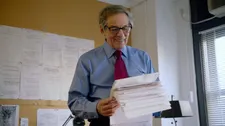 |
| Robert Caro in his office Photo: cinematography Mott Hupfel, courtesy of Wild Surmise Productions, LLC / Sony Pictures Classics |
I worked with two editors on this, first Molly Bernstein, then Kristen Nutile. Especially with Kristen as we were fine-tuning the film - she has a beautiful sense of film rhythm. She has a way of making something go from feeling straightforward to feeling sparkly and cinematic in her timing.
AKT: The moment you said the word sparkly, the light hit your fingers !
LG: That’s very cinematic! I think in a similar way we were trying to capture the right pace for this film. It was especially hard in how do we begin the movie. To ground you into - this is going to be fun and funny. You don’t need to be a Robert Caro fan to appreciate it, but if you are, we’ve got you. We understand and take you somewhere, hopefully, you haven’t been before.
And to establish that it’s a film about two men that we’ll pass the baton off from one story to the other story - that was very very hard to achieve in an opening without weighing it down too much. I think that’s where the rhythm was the most complicated for us and we agonised over it.
AKT: I think it works beautifully. It reminds me of the great quote you have by Colm Tóibín “We read with our breath.” In a way we watch with our breath, too.
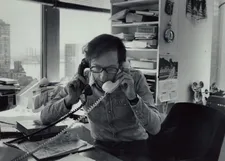 |
| Robert Gottlieb holding two phones Photo: Thomas Victor, courtesy of the Estate of Thomas Victor, LLC / Sony Pictures Classics |
LG: That’s true! I think he is so wonderful. I wish I could play his entire interview for everybody, because everything he said was magnificent like that.
AKT: He is fantastic. When Volker Schlöndorff, who is a friend, was shooting Return To Montauk in New York, I was, together with Margarethe von Trotta, an extra, standing on the steps of the New York Public Library waiting for Colm (who co-wrote the film) to come up the stairs and greet us.
LG: That’s fantastic.
AKT: How was interviewing Bill Clinton? I wrote down my favourite quotes from everybody. Clinton says: “What’s important is to see imperfect people have great aspirations.”
LG: I was really thrilled to be able to interview Bill Clinton. I felt that as a President who could speak to what it is like to have somebody write a biography of you and to speak about Caro’s capturing of Johnson, but also he has been an author of my father’s for a long time. So I felt that he had so much to talk to us about. And I interviewed him - this is interesting - the interview took place on the morning of January 6.
AKT: 2021?
LG: Yes! But it was before everything happened. In retrospect whenever I watch that interview I think, isn’t that crazy? Stuff was starting to happen while that interview was going on.
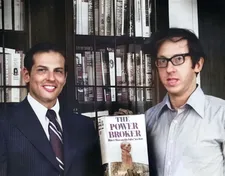 |
| Robert Caro with Robert Gottlieb in 1974 Photo: Martha Kaplan, courtesy of Wild Surmise Productions, LLC / Sony Pictures Classics |
AKT: That is super crazy! Your two heroes, I noticed, not only have the same first name, but the same middle initial! If they had matching monogrammed L.L.Bean tote bags they could easily get them mixed up!
LG: That’s very funny. This is an aside, my father’s middle name is Adams and he’s named after his uncle, whose name is Arthur Adams who turned out to be a major Russian spy who was in charge of stealing nuclear secrets from the US for Russia. He was Russian, my father’s aunt married him. That’s another movie.
AKT: I learned through Toni Morrison and your father: “No cat in the first paragraph.” Ever? Is that a rule?
LG: I’m not sure he means that you can never have a cat in the first paragraph. I think he meant he felt that this cat was inappropriate to this first paragraph. An alternate title to the film would have been No Cats in the First Paragraph.
AKT: Why is 22 funnier than 18?
LG: I don’t know. Only he understands that. Maybe it is. Is it funnier?
AKT: Yeah. I just totally bought it. I did not know that this was one of your father’s claims to fame, that he came up with the title Catch-22 [for Joseph Heller’s book]. The visuals you capture are also important to set the tone. Are the pictures on the wall Marion Davies and Clark Gable?
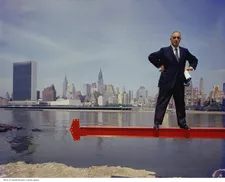 |
| Robert Moses in 1959 Photo: courtesy of Getty/NBC News Archive Arnold Newman Collection and courtesy of Sony Pictures Classics |
LG: And the other one is Norma Shearer, I don’t know if you can see her in the film. My father used to spend a fair amount of time in Rochester at the Eastman Kodak House [Museum], looking at original prints of movies with the film writer Jeanine Basinger. They worked on a lot of books together. And they found those posters in a storage.
AKT: Those are beautiful, those posters.
LG: Aren’t they beautiful?
AKT: And then there are dog posters. Those are a little bit like the ones I would get at a pharmacy as a gift when I was maybe five. What’s the history of those?
LG: He loves dogs. Certain things just speak to him and he loves them. They are like 3D, they come out.
AKT: Wow, mine didn’t, the ones from the pharmacy. And the handbags? Are they still around?
LG: Oh yes, there are fewer of them. They used to line every wall in my parents’ bedroom but now many of them are in boxes. I mean, he has thousands of them. And he loves them. And they are very very beautiful.
AKT: They are bakelite?
LG: They are actually lucite, which is similar to bakelite.
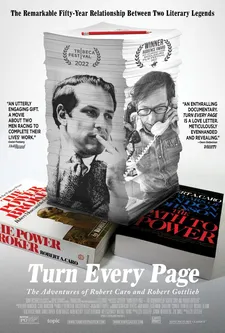 |
| Turn Every Page - The Adventures Of Robert Caro And Robert Gottlieb poster |
AKT: Do you get to take them out for a walk?
LG: Not anyone I choose, but certain ones. I have a few in my house that I’m allowed to use. My two producers and I each carried one to the premiere of the movie. Nobody noticed, but we thought it was nice.
AKT: I think that’s lovely. From the handbags to King Lear - you are the daughter making this film, how do you feel about Cordelia?
LG: I hope I have a happier ending than she has! No, my father’s fixation on Lear - he knows the entire play by heart, and he quotes Lear a lot. I think in some way it has been useful to him in a way; he himself had a very angry father. And I think he was very determined not to become that. So maybe I benefitted from my father’s obsession with Lear. He’s the greatest, most loving, most extraordinary father. I’m so lucky to have him.
AKT: It comes across. It’s a very loving documentary. There are so many facets. The ballet! And he describes himself as “the perfect reader.” Nobody reads better than he does.
LG: Who knew it was a competition?
AKT: Was there something that surprised you about either of the two men that you didn’t expect at all? Or was it more of a fine-tuning?
LG: More than surprised, I would say I was delighted and energised and inspired by how extraordinary they are, each of them in their own very different way. It was really a process of discovering more and more how extraordinary each man is and feeling so privileged to spend that time with them and learn so much from them.
AKT: Beautiful film, thank you very much and thank you for this conversation!
LG: It’s so lovely to meet you and you’re so great to talk to! Have a wonderful holiday!
Turn Every Page - The Adventures Of Robert Caro And Robert Gottlieb opens at Film Forum in New York on Friday, December 30 with a Lizzie Gottlieb and Robert Gottlieb Q&A following the 7:45pm screening. The Royal Laemmle in Los Angeles will also have the documentary starting on December 30.








